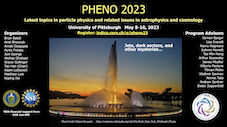Speaker
Description
When gravitational waves propagate through a medium with a changing equation of state, their spectrum distorts. A changing equation of state results from massive particles decoupling from the cosmic plasma as the temperature decreases. For low-frequency stochastic gravitational waves, this leads to deviations from the standard $k^3$ scaling. Interestingly, low-frequency waves emitted from short-duration phase transitions are affected only after they enter the horizon, making them sensitive to the thermal history of the universe. An example of a model with a changing equation of state is the weak confined standard model (WCSM). The WCSM is a phase in which the SU(2) component of the electroweak force is strongly coupled. This phase could have possibly existed in the early universe at temperatures much greater than 100 GeV. Propagating through the WCSM phase causes distortions in the spectrum of gravitational waves that can be detected with space-based detectors such as LISA.
